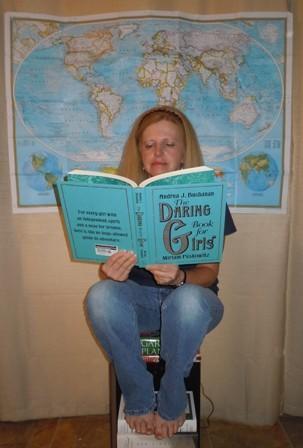Cheryl Hughes: Lest We Forget
A couple of weeks ago, my granddaughter, Sabria, got her large candy cane out of Christmas storage. Her friend Jazz was there, and Sabria wanted to show it off. She has had the cane since she was four years old. It is made of very hard plastic and is the size of an actual cane, so she uses it as a walking stick during the holiday season.
I was in the kitchen, when the girls brought the cane to me, Sabria in tears. It was in three pieces. “Can you fix it, Gee?” she asked.
“I’m not sure,” I said, “I’ll do my best.”
Later that day, when we were in the front yard, Sabria pulled a long wispy branch from the weeping willow. Jazz grabbed the other end and said, “Let’s play tug-of-war!”
Sabria took the branch away from her. “Did you learn nothing from the candy cane?” she asked.
Sabria did. She learned that you can break something important in such a way that it can never be put back together.
There is a song I listen to every Christmas called “Christmas in the Trenches.” It was written by John McCutchen . The song tells the story of the Christmas Truce of 1914, during World War I. It happened at the Western Front between British and German soldiers.
The song begins: “My name is Frances Tolliver, I come from Liverpool. Two years ago the war was waiting for me after school.” The lyrics continue with a list of war zones the young soldier finds himself in before he comes to settle at the Western Front, on the Allies’ side, with his fellow British soldiers. It is Christmas, and thoughts turn to England and his family. The shooting has stopped and the air is silent until a German voice begins to sing a Christmas carol. The soldiers listen in disbelief then one of their own sings a carol in English.
The singing continues for a few more songs before one of the German soldiers, carrying a truce flag, approaches the young Brits. “Then one by one on either side walked into no-man’s-land,” Tolliver says. He describes the comradery between the two sides as they trade cigarettes and chocolates, share brandy and show each other pictures of their families. They finish off with a soccer game between the two sides: “…in a flare-lit soccer game we gave ‘em hell.”
Daybreak brings war once more. Soldiers from both sides settle back into their trenches. Young Tolliver reflects on the question he and every other participant of “that wondrous night” must have on their minds: “Whose family have I fixed within my sights?”
Frances Tolliver lives through the war, but never forgets its lessons: “Each Christmas come since World War One I’ve learned its lessons well. That the ones who call the shots won’t be among the dead and lame, and on each end of the rifle, we’re the same.” He understands that you can break something important in such a way that it can never be put back together.
Sabria is just a little girl. She doesn’t understand the brokenness of war. Still, she understands that her candy cane is lying in three pieces on the dining room table. There is a cross on the site of Saint-Yves, Belgium to commemorate the Christmas Truce of 1914. It was erected in 1999. It reads: “1914—The Khaki Chums Christmas Truce 85 years. Lest we forget.” I’m still asking Sabria’s question: Did we learn nothing?
- Log in to post comments



























